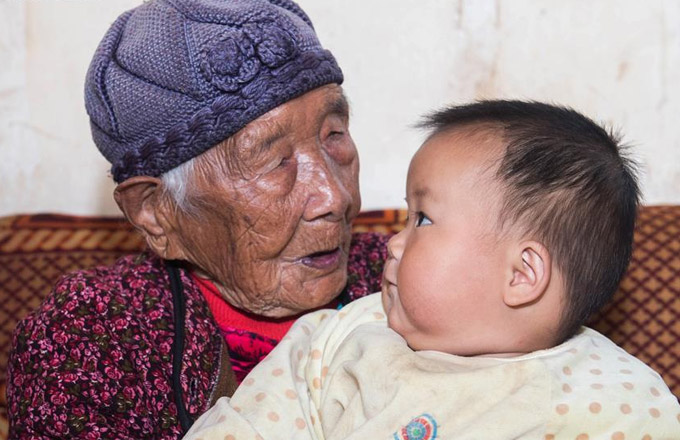Crime rules 'hard to follow'
![A prosecutor and the mother of a teenager in a reformatory check whether the boy has clothes warm enough to withstand winter weather. On Jan 16, six prosecutors in Zhengzhou, Henan province, accompanied relatives on a visit to 30 young off enders at the reformatory. [PROVIDED TO CHINA DAILY] Crime rules 'hard to follow'](../../images/attachement/jpg/site1/20130220/00221917dead128e479a05.jpg) |
|
A prosecutor and the mother of a teenager in a reformatory check whether the boy has clothes warm enough to withstand winter weather. On Jan 16, six prosecutors in Zhengzhou, Henan province, accompanied relatives on a visit to 30 young off enders at the reformatory. [PROVIDED TO CHINA DAILY] |
New guidelines on juvenile crime are proving difficult to follow, particularly in rural areas, due to a lack of detail, according to prosecutors.
The revised Criminal Procedure Law, effective from Jan 1, has 11 articles designed to improve the way youth offenders are handled by the system. These include sealing files, compiling background reports on young people, having appropriate adults present during questioning and giving prosecutors discretionary powers to issue community service orders.
But confusion remains when it comes to enforcement, said Yue Huiqing, director of juvenile crime for Beijing Municipal People's Procuratorate.
"We need more specific instructions," she said. "Otherwise the law may not have the proper effect."
Prosecutors have largely applauded the revised law, as it focuses on education, not punishment, for juvenile offenders.
Beijing has already witnessed the impact of some of the articles through a successful pilot project in 2012.
Each district now has a juvenile crime office, staffed by 114 specialized prosecutors. Last year, it handled a combined 2,000 cases, the city's procuratorate said. By comparison, in August 2010 Beijing had just 30 specialized prosecutors.
For Yue, a former judge who served for 20 years, sealing the files of young people sentenced to less than five years in prison and allowing the authorities to impose community service orders for minor crimes instead of prosecuting are signs of real progress.
"But the law still fails to answer many questions," she said.
She said having a criminal record can be a major career obstacle, as most jobs and exams require a certificate declaring an applicant has no previous convictions. The law now states only judicial bodies and "relevant departments" can access sealed files.
"But it doesn't define 'relevant', which is likely to create loopholes," Yue said.
"Can a young offender now apply for China's civil service exam? Can he or she take part in the teacher exam?" she asked. "These are the questions we're still asking, even though the law is in effect."
Fu Xiaomei, a prosecutor in Beijing's Chaoyang district, said at least four young offenders applying to study abroad had recently contacted her about requests by foreign embassies for criminal record information.
"I had no idea how to handle this because I couldn't confirm whether embassies are relevant departments," she said. "It's very frustrating for the young people and their parents, and for me."
Budget constraints
Questions also exist over the standards and funding for background reports on offenders and on the presence of appropriate adults during the young person's contact with the justice system. As it stands, Fu said, it is unclear where the money is meant to come from, how much should be spent and who is qualified to be an appropriate adult.
In Beijing's Chaoyang district, college law school professors usually compile reports that look at a young person's family and education background and are presented to prosecutors and judges. However, in Haidian district it is mainly social workers who do this job.
"I'm told Haidian prosecutors spend 2,000 yuan ($320) per report, but we (in Chaoyang) pay just 500 yuan," Fu said.
Yue from the municipal procuratorate confirmed the capital has no rules on who should compile the reports, which under the revised law are not compulsory, nor do the reports feature in the city's judicial budget.
The same goes for appropriate adults, who are required at all questioning if a youth's legal guardian is unavailable.
Last year, 325 people acted as appropriate adults as part of a pilot program in Beijing. They mostly included lawyers and social workers, yet Yue insists a standard needs to be set and legal training provided.
"Some social workers have responsibility but are short on experience or have no legal knowledge," she said, adding that training also requires money from the government.
"Generally, the revised law sets out principles for dealing with juvenile offenders, but the more specific guidelines there are, the better for prosecutors," Yue added.
Enforcement is key
Despite the challenges, most legal experts agree Beijing and Shanghai are already seeing progress. Yet for smaller cities and rural areas, the new rules on juvenile crime are proving harder to enforce, according to prosecutor Zhou Liwen.
His city, Changsha, capital of Hunan province, still has no specialized office or any examples of cases in which the revised articles have been used, he said.
"In some low-level courts, prosecutors don't pay attention to juvenile crime and sometimes ignore the special procedures for youths," he said, explaining that too few people are shouldering too many cases.
City authorities are studying how to better implement the law, but Zhou conceded, "prosecutors generally lack awareness of how to protect a young person's rights".
Wang Ping, managing director of the Chinese Society for Juvenile Delinquency Prevention Research, the only NGO in China that specializes in helping young offenders, echoed the concerns of Zhou and the prosecutors in Beijing.
He said there are blind spots in the revised law and there is still a long way to go to fill in the blanks. But he welcomed the progress on juvenile work in the country.
"We need more research, especially in rural areas," he said. "Our shortcomings now will be helpful to perfect the law and contribute to our future work."
"After all, we cannot write all things in one article. A law's creation needs much time and is complicated. I hope the authorities can take more practical measures and give training to grassroots workers," he added.
Contact the writer at caoyin@chinadaily.com.cn



















